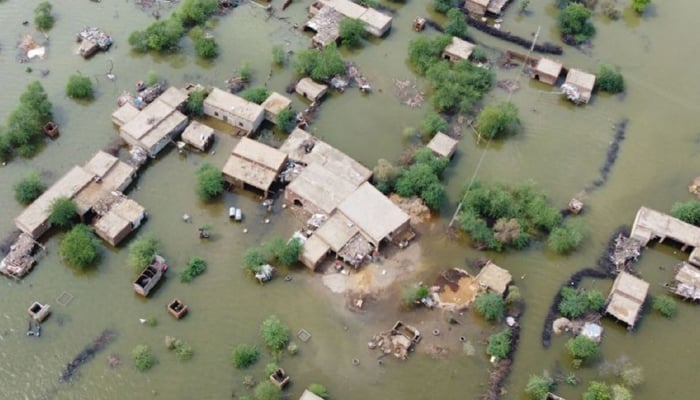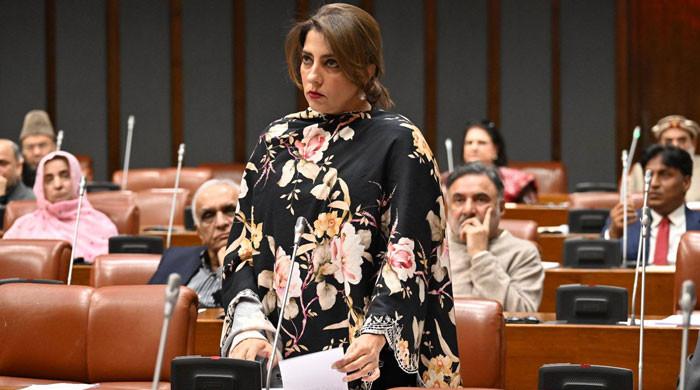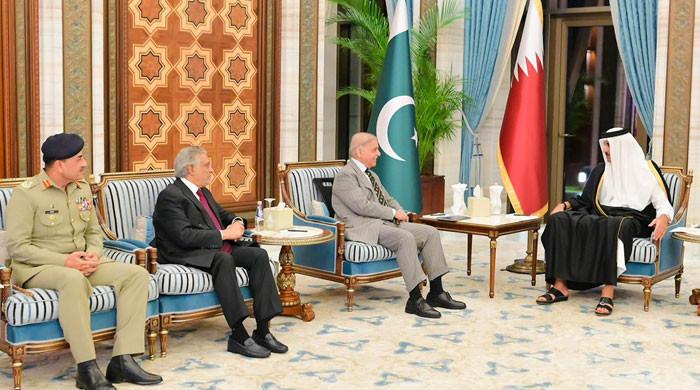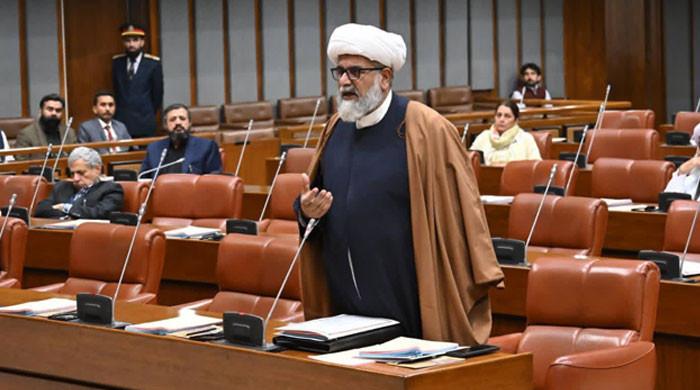‘Support has decreased, but not flood waters,’ PM says ahead of Geneva moot
$30 billion needed for addressing damage caused by flood and to build the country’s climate resilience, PM says
January 06, 2023

Ahead of Geneva's International Conference on Climate Resilient Pakistan, Prime Minister Shehbaz Sharif has said that while the international community has started overlooking Pakistan's flood, the country's still struggling in the aftermath of the disaster.
“The apocalyptic floods have claimed 1,700 lives,” said the prime minister in an opinion piece in the international publication The Guardian.
In the article, the PM recounted the extent of the devastation wreaked on two of the country's four provinces, and the suffering of the families who had been living there. He also added that 33 million people have been affected by the floods.
“The number of food-insecure people in Pakistan has doubled to 14 million,” the PM wrote. “Another 9 million have been pushed into extreme poverty.”
While discussing the inundated provinces, the PM said that they looked like “permanent lakes” and that the lives of the locals had altered forever. He also expressed concerns that there is a lingering fear that by July this year, these areas may flood again.
He also expressed gratitude towards the international community for its support during the ordeal but mentioned that the attention has receded, while floodwaters in large parts of Sindh and Balochistan had not.
PM Shehbaz, in his article, also emphasised the fact that Pakistan’s floods were not a one-off instance, but part of a larger pattern of climate extremes.
“Earlier in spring 2022,” the PM wrote, “the country was in the grip of a scorching, drought-aggravating heatwave that caused forest fires in the west.”
While mentioning the sharp swings in weather patterns, he pointed out that some of the areas that had received record temperatures were subsequently submerged, and this pattern was becoming a norm.
Furthermore, the prime minister recounted the efforts of his government to assist the flood-affected people, whose resilience he commended.
He said that the government had managed to distribute more than $250 million (£200m) to more than 2 million households, and spent a total of around $1.5 billion in emergency relief, despite the fact that the country’s economy is already struggling.
He also said that the damaged communication networks between cities and villages were restored very quickly due to the government’s efficiency.
“World Health Organization (WHO) had designated the situation as a high-level health emergency,” he wrote, “and the feared water-borne diseases and localised epidemics did not break out due to the efficient working of our vast network of medical camps.”
However, the PM reiterated, that the worst was far from over, since more than 2 million homes, 14,000km of roads and 23,000 schools and clinics had been destroyed.
The estimated damage caused by the floods exceeded $30 billion, according to the post-disaster needs assessment (PDNA), carried out in collaboration with the World Bank and the EU. This sizeable figure is approximately a 10th of Pakistan’s entire GDP.
In the article, the prime minister also referred to a visit to Sindh made by UN secretary general, António Guterres, in September, and his shock at the large-scale devastation in the province.
“Terming it “climate carnage”, the secretary general found himself at a loss for words,” the PM stated.
The UN had termed Pakistan’s 2010 floods as the worst natural disaster it had ever responded to, and now that pales in comparison to the current disaster.
The PM said that given the magnanimity of the challenge, “Pakistan simply cannot do this alone.
“This is why the secretary general and I are co-hosting the International Conference on Climate Resilient Pakistan in Geneva on 9 January”. He said that the country would be joined by world leaders, and representatives of friendly countries and international organisations.
At the conference, the PM plans to present a comprehensive roadmap — which has been developed with the assistance of numerous organisations, including the World Bank, the UN, the Asian Development Bank and the EU — for post-flood reconstruction and rehabilitation.
This framework, called the Resilient Recovery, Rehabilitation, and Reconstruction Framework (4RF), essentially envisages a two-pronged response.
The first part of the 4RF deals with addressing the immediate challenges of recovery and reconstruction and requires a minimum funding of $16.3 billion over a period of three years.
Half of this funding, he said, will be arranged by Pakistan from its own resources, while assistance from the international community is needed for the second half.
The second part of the 4RF aims to build the country’s climate resilience and will require an investment of $13.5 billion over a 10-year period.
According to the PM, this investment will be used to improve the country’s communications infrastructure, irrigation, and to set up early warning systems to counter any future natural disasters.
Referring to the Geneva conference as the “beginning of a long and arduous journey”, he hoped that the effort will have a “substantive outcome [that] will reassure millions of imperilled people.”
The prime minister concluded his article by recapitulating that the impending threat of climate disaster could only be mitigated if the international community worked together.











